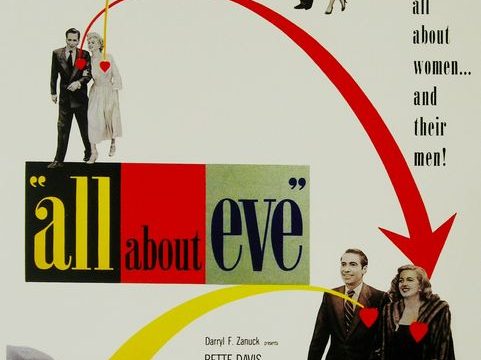Doug’s Cinematic Firsties is a recurring series wherein Douglas Laman (A.K.A. NerdInTheBasement) will review a well-known classic motion picture that he’s never seen before.
Just like last month’s excellent Boots Riley directed feature Sorry To Bother You, the 1950 motion picture All About Eve is all about the price one pays when ascending the ladder of American success, with both examining how disenfranchised members of American society tend to have to sacrifice their own individual personalities in order to fit a narrow definition of what constitutes “successful” as defined by powerful white men. For All About Eve specifically, screenwriter Joseph L. Mankiewicz, adapting a short story by Mary Orr, examines this phenomenon by looking at how all sorts of gender-related double standards for fame impact a trio of women, one of whom is the titular Eve, an acclaimed actor getting a prestigious award as the movie begins.
Eve Harrington (Anne Baxter) wasn’t always such a noteworthy performer though, once upon a time, she was simply someone who went and saw every performance of the newest play starring her acting idol Margo Channing (Bette Davis). Karen Richards (Celeste Holm) manages to get Eve and Margo to meet and the two hit if off so well that Eve is soon living with Margo in her luxurious home. The two of them living together starts out as a dream-like arrangement, but Margo soon finds herself paranoid about how closely Eve is watching her. It feels like Eve is studying her, as if Eve plans to become the spitting image of Margo and perhaps even replace her.
The story of All About Eve gradually increases in darkness as the story goes on and Eve’s true plans become crystal clear, but the whole film carries a snappy style of dialogue, as penned by Joseph L. Mankiewicz, that’s highly entertaining to watch, especially since so much of the best pieces of dialogue are delivered by Bette Davis. Davis, who gives Margo Channing this awesome go-to facial expression that suggests she’s so totally done with whatever situation she’s being forced to deal with, has some truly superb line deliveries here that make it clear why quotes like “Fasten your seatbelts, it’s going to be a bumpy night” have endured as long in the pop culture consciousness as long as they have.
Bette Davis is a true marvel in this lead role, exuding a cool as a cucumber demeanor that makes it clear why Eve could fall head over heels for her while also selling the characters more vulnerable moments with equal levels of conviction, most notably a pivotal conversation in a car with Karen during a snowstorm that sheds some light on all personal sacrifices Channing has made to conform to industry standards for what women are supposed to be. Davis is far from the only noteworthy performance on hand here of course, the whole cast is so stacked with great performances that Marilyn Monroe shows up for a brief memorable cameo! In terms of other stand-out turns, Anne Baxter is also doing sublime work here as she handles the various forms Eve takes on and I absolutely love Thelma Ritter as Channing’s maid Birdie, she has a delightful rapport with Channing that see’s Birdie being the one person who won’t take any of Channing’s nonsense in stride.
Also on hand in the cast is George Sanders, who gets to introduce the viewer to the sharp-witted style of dialogue that runs rampant through All About Eve in his extended voice-over monologue in the features opening scene. Sanders plays Addison DeWitt, a theater critic who gets caught up in Eve’s subterfuge and his character is especially a fascinating creation who, like Eve, reveals his own hidden personal motivations as the story goes on. The fact that, ultimately, the trait that defines DeWitt as a villainous figure is that he’s a man who wishes to control women (namely Eve) for his own personal gain while eschewing their own autonomy (he’s like the 1950’s equivalent of an incel) is utterly fascinating. Such a turn also ties nicely into the overriding themes of All About Eve concerning how often the humanity of women gets trampled in American society as well as how such a process creates a cycle that can even turn women on each other, an idea exemplified by an ending suggesting Eve will now be prey to the same admirer turned replacement process she put Margot Channing through.
Such a theme is explored primarily through top-flight performances, dialogue and character arcs in All About Eve, though let it not be said that the visuals don’t play a key part in the proceedings too. Opting to shoot in black-and-white allows director Joseph L. Mankiewicz the chance to frequently utilize shadows (which, as many Akira Kurosawa movies show, really pop in black-and-white coloring) in scenes like DeWitt creeping up to Eve’s dressing room that fit right into the uneasy mysterious atmosphere of so much of the story. Any way you look at it, All About Eve is just flat-out incredible, it’s thoughtful take on tragically still all too relevant themes about women trying to preserve their own individuality in society is exemplary as is the outstanding lead performance from the one and only Bette Davis.

